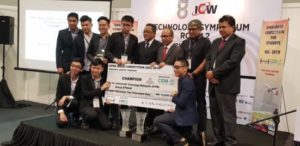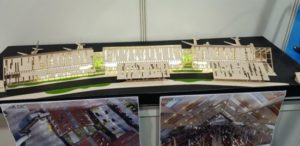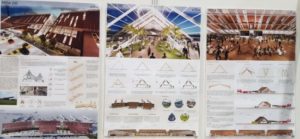In conjunction with the International Construction Week (ICW), CIDB had organised the MSSA/CIDB OIC 2019 competition on Wednesday 20 March 2019. One of the Universiti Teknologi Malaysia (UTM) participating teams, was announced as the champion bringing back RM10,000 in cash and a championship trophy. The participants were from the Faculty of Built Environment (FABU) & Surveying and the School of Civil Engineering (SKA), Faculty of Engineering. The student team members consisted of Jonathan Chong (M Arch), Aw Khai Hoong (3 SBEA),Chan Kei Wern (3 SBEA), Chow Zhen Nam (2 SBEA), Julius Wang The Chian (3 SKAW), and Wong Sheng Yuen (3 SKAW). They were supervised by Dr Abdul Halim bin Hussein (FABU), Dr Lim Yaik Wah (FABU) and Ts. Mohd Zamri bin Ramli (SKA). The other UTM team was among the top five finalists and received RM3,000. The team members were Lim Shu Yin (M Arch), Kathy Chong Shu Wei (M Arch), Joanna Lim Yin (M Arch), Lim Yong Zhen (M Arch), Hng Jia Ming (SKAW), and Kevin Chong Tshun Hiung (SKAW). Their team supervisors were Dr Abdul Halim bin Hussein, Dr Lim Yaik Wah and Dr. Shek Poi Ngian (SKA)
MSSA and CIDB had launched the OIC-2019 Regional Airport Terminal Competition on 18 September 2018. The annual competition was open to students in the fields of architecture and civil engineering in Malaysia. The 2018/2019 MSSA/CIDB OIC secretariat received a total of 55 group entries from 11 universities. The goal of the design strategies should be geared towards modernisation with regards to sustainability, constructive ability and functionality in employing steel as the main structural and finishing material.
Each UTM team consisted of 4 students from FABU and 2 students from SKA. The competition brief was adopted as an assignment course, MBES 1023 (Advanced Architectural Technology and Construction) taught by Dr. Lim Yaik Wah. Meanwhile, Assoc. Prof. Dr. Tan Cher Siang of SKA had given a lecture on “Integrated Structure Design” on 7 October 2018 as input to his Master of Architecture students to expose them to the competition. The supervisors from FABU were Dr. Abdul Halim Bin Hussein and Dr. Lim Yaik Wah, while the supervisors from SKA were Prof. Dr. Ahmad Baharuddin Abd Rahman, Assoc. Prof. Dr. Tan Cher Siang, Ts Ir Mohd Zamri Ramli and Dr. Shek Poi Ngian.
The competition comprised 3 stages. The first stage, (Stage 1) was conducted internally at the university level on 20 December 2018, at Seminar Room, M46, SKA, UTM. This was to choose the 5 shortlisted teams to compete at Stage 2 as required by the organiser. The panel of judges consisted of Assoc. Prof. Dr. Mahmud Jusan (FABU), Assoc. Prof. Dr. Mohd Zin Kandar (FABU), Assoc. Prof. Dr. Ramli Abdullah (SKA) and Dr. Mariyana Aida Ab Kader (SKA) while Stage 2 (semi-final) judging at national level was held on 29 February 2019. In the second stage, the Panel of Judges consisting of academics and professionals from the architectural and structural engineering fields had selected the top 10 teams to compete in the third stage, (Stage 3). 3 of the 10 shortlisted teams were from UTM. Each of the 10 teams was given a stipend of RM1000.00 for Stage 3 judging preparation which is mainly for model making. The 10 finalist teams were required to present their brainchild’s verbally and visually using their models to the Panel of Judges on 2 March 2019 at UiTM Shah Alam, Selangor to select the 5 winning finalist teams. 2 groups form UTM were announced as the top five winners in this final stage.
This competition has offered a platform for the architecture and civil engineering students to work together in building design competition. The collaborative effort between the two disciplines has helped students notice that building design neither lies within the individual jurisdiction of the architect nor the civil engineer separately. Instead, by working together, they can enhance both architectural fascination and structural manifestation to the maximum. Notably, the competition has also helped to bridge the gap between the training of architecture and civil engineering communities and has encouraged multidisciplinary collaboration.




